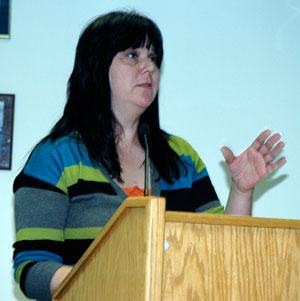MARYSVILLE — A trio of personal testimonies as to the benefits of medical marijuana was met with interest by the Marysville City Council on Dec. 12, as two citizens of Marysville and one from Lake Stevens urged them to allow the city’s moratorium on medical marijuana dispensaries to expire on Jan. 5 of next year.
Nonetheless, the Council voted unanimously to extend the moratorium into June of 2012, after Marysville City Attorney Grant Weed warned of potential confusion in interpreting the existing laws regulating medical marijuana, as well as conflicts that could arise between municipal, state and federal laws on the subject.
“There are several moving parts to the law which have yet to be resolved,” Weed said. “The provisions have become more vague, and the state Legislature is interested in clarifying them. The federal Controlled Substances Act is still in effect, under which marijuana is deemed to have no medical value, and its use, possession and sale remain illegal, which preempts any state law. The law is anything but settled.”
After city of Marysville Chief Administrative Officer Gloria Hirashima noted that the city of Marysville has been discussing zoning responses with the cities of Arlington and Lake Stevens, which are also considering such an alternative, Lake Stevens resident Laura Healy spoke to the Council about the collective garden that she’s operated for the past two years in Shoreline.
“We want to be regulated rather than eliminated,” said Healy, who’d previously spoken to the Council in July of this year, just before they imposed the initial six-month moratorium. “Our patients need safe access to their medicine. We don’t want them to have to call somebody up and pick it up in a parking lot out in the open. The public shouldn’t have to see it.”
When asked by Council member Michael Stevens, Healy elaborated that such co-ops follow self-imposed boundaries, such as not establishing locations within 1,000 feet of schools or day care establishments, because they respect the right of parents to shield their children from what may be a taboo subject to many families. Council member Carmen Rasmussen requested copies of the ordinances of cities such as Shoreline and Mukilteo, which Healy cited as balancing the needs of medical marijuana dispensaries with their surrounding communities. Healy promised to send those to Hirashima for city of Marysville staff to study.
Marysville resident Joanna Kasner followed Healy by recounting the centuries of historic precedent for legal medical marijuana usage, before sharing how medical marijuana had given her back a part of her life that she’d thought she’d lost after a physical assault left her unable to function without narcotics.
“It damaged my lower back, my shoulders and my knees,” Kasner said. “I lost my job as a long-haul trucker. Medical marijuana minimized the side-effects I’d experienced with opiates, and the people at the dispensaries have treated me with respect and kindness.”
Marysville’s Lonnie Smith is a 58-year-old fibromyalgia sufferer who’s also coping with a hernia, and she touted medical marijuana’s “instant results” without any side-effects.
“I’m not laid out in bed with chronic pain,” Smith said. “I just want safe access to my medicine. Please don’t make me go out on the streets to get it.”
Weed’s final advice to the Council that evening noted that, regardless of state laws, the city could potentially be charged with aiding and abetting violations of the Controlled Substances Act under federal law if it allowed such dispensaries within city limits.



